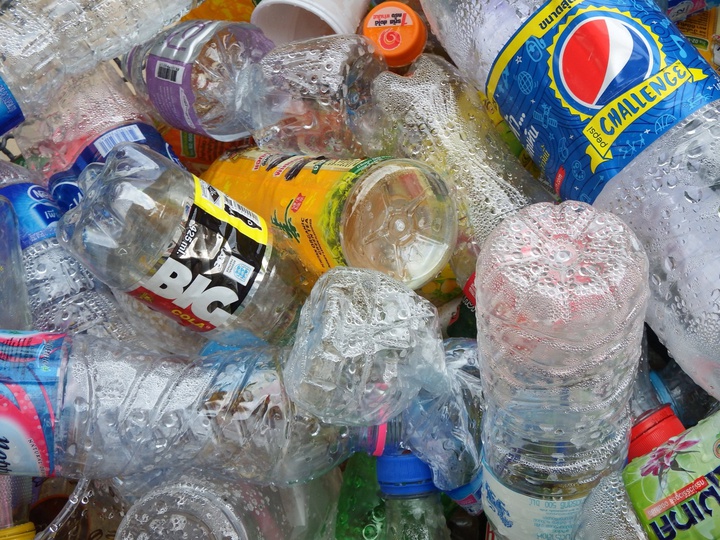Jessica Cejnar / Tuesday, Feb. 18, 2020 @ 5:21 p.m. / Environment, Infrastructure, Local Government
With Scrap Aluminum Value In The Tank, Hambro Looks To Bring Recycling To Klamath, Gasquet, Smith River

To maintain profitability, Hambro Forest Products is proposing to expand buy back services to Del Norte's outlying areas. Photo: https://www.needpix.com/photo/1479263/recycled-plastic-bottles-bottle-empty-recycling-recycle-bin-trash
Visitors to the buy back center at Hambro Forest Products recently likely received an extra bit of paperwork along with the nickels and dimes in exchange for their bottles and cans.
Staff at Del Norte County’s only recycling center gave out business cards in the last few weeks notifying customers that due to a drop in the value of scrap aluminum, continuing to operate is challenging. The card included the phone numbers to CalRecycle, State Sen. Mike McGuire, Assemblyman Jim Wood and Governor Gavin Newsom.
“That little business card was to get the phone numbers in the hands of recyclers,” Randy Scott, Hambro’s general manager, told the Wild Rivers Outpost on Tuesday. “(We’re) hoping they would call and reach out to CalRecycle and share their concerns.”
Since Hambro began accepting material that carry a California Refund Value in January 2018, the value of aluminum scrap has declined by 25 percent, Scott said. The value of plastic PETE 1, or the plastic found in soft drink and water bottles, has also declined by 25 percent, he told the Outpost.
Consumers receive the California Refund Value, or CRV, for each eligible beverage container they bring to Hambro. According to Scott, the amount of money Hambro receives for the scrap aluminum it takes in is what keeps the company operating. He said the company hopes scrap values turn around, otherwise changing things will likely require a legislative fix, which “will not happen fast for some centers.”
“We need CalRecycle to provide financial support to help keep these recycle centers open until the scrap prices rebound,” Scott told the Outpost in a written statement.
Roughly 300 recycling centers statewide have closed in the past year because they weren’t able to stay profitable, he said.
To maintain its profitability, Hambro Forest Products is proposing to bring buy back services to Smith River, Klamath and Gasquet. The company is also proposing starting a recycling program at Crescent Elk Middle School and other Del Norte schools.
Hambro approached the Del Norte Solid Waste Management Authority on Tuesday for support on its two pilot projects.
According to DNSWMA Director Tedd Ward, support from the joint powers authority is necessary for CalRecycle to approve a grant application to pay for the equipment and staff to operate the project
“If the board doesn’t support this, that would be that,” Ward told solid waste commissioners. “But if this is something the board would like to see happen, (that) increases the likelihood it will happen.”
Del Norte County had been without a recycling center for about three months when Hambro WSG began accepting bottles and cans in January 2018. After accepting CRV material for decades, the county’s only recycler, Julindra, closed its doors. Though curbside recycling was available through Recology Del Norte, residents wanting to receive the CRV had to travel to McKinleyville.
According to Scott, neighborhood supermarkets like Safeway, Grocery Outlet and Walmart are required to accept CRV material when a recycling center closes or pay a penalty of $100 per day to waive their responsibilities.
“It would be much more convenient and feasible for them to pay,” he said. “This could lead to no CRV recycling available in Del Norte County.”
On Tuesday, Hambro CEO David Slagle told the DNSWMA that after the company began distributing business cards over the last several weeks, it received notice that the price of scrap aluminum would decrease further.
“We started at 85 cents a pound for aluminum and for the last load we delivered (we received) 41 cents a pound,” Slagle said. “Two days after we delivered that last load we were called by the processor who said it was dropping to 27 cents. We’re looking at opportunities to spread our costs over a bigger area. That’s why we need to go to schools, go to outlying areas.”
Hambro currently sends its CRV materials to a processor in Redding. If that processor goes under, Hambro will have to deliver Del Norte CRV materials to Sacramento, Slagle said.
The value of plastics has decreased by an even greater amount, Slagle said. It’s now down to about 3 cents, he said.
“We like being in this business,” Slagle said. “We’re maintaining our profitability by spreading these costs now.”
Commissioner Blake Inscore, one of two Crescent City representatives on the DNSWMA board, said Hambro embarking on a pilot project to try to maintain buy back services in Del Norte County as well as its profits is evidence of the authority’s advocacy responsibility. He noted that continuing to push for a legislative fix is important because rural counties are never going to have the volume of urban areas to compensate for market fluctuations.
“For the public, if you’re holding onto those cans or if you’re just throwing them away because you’re not motivated to take them and recycle them responsibly for money, you’re making the problem worse for all of us,” Inscore said. “Be a good recycler, take the CRVs and turn them in.”
If CalRecycle approves Hambros’ pilot programs, weekly buy back services will be available at the Klamath and Gasquet transfer stations and at Howonquet Hall in Smith River, Scott said. The days and hours they will be open will be flexible, he said.
One of the requirements of CalRecycle is the pilot programs have to be open for eight hours during the week and eight hours on the weekend, he said.
CLICK TO MANAGE